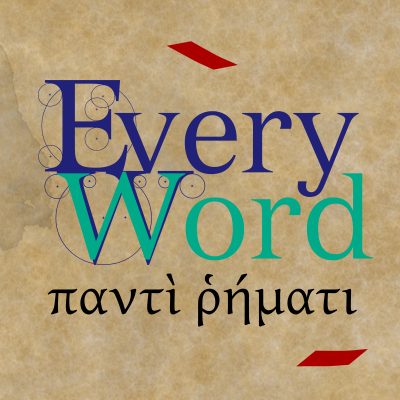Reader: Take note, Days 15-27
Description
Reader: take note, for days 15-37
Greetings and welcome to this second edition of the Reader: Take Note series. This is an occasional series aimed at providing extra commentary and encouragement for those following the Digging Deeper Daily reading plan. No matter where you are in the reading calendar, I hope that the things I share in this episode will support the idea that God’s Word has many treasures for us, and it always pays to dig deeper.
If you have questions or comments, my favorite way for you to send messages to me is via the contact button at dailybiblereading.info. I’m always interested to hear your thoughts.
On day one of our journey I mentioned Solomon in connection to Job. I challenge you to find similarities to Solomon’s writings in Job, in particular, I am most often thinking of Ecclesiastes. Actually, not all commentators think that Solomon was the writer of Ecclesiastes. But that need not concern us. As for Job, I found in a Wikipedia article that scholars consider that Job was written surprisingly late, from the 7th to 4th century BC. However Solomon lived in the 10th century BC. Other writers think the writing of Job to far predate Soloman. So far I have found no one who supports my hypothesis that Solomon wrote the book of Job. Nevertheless, let’s look at some parallels.
Job hated his life and so did Solomon.
GW'20 Job 7:16 :
16 I hate my life; I do not want to live forever. Leave me alone because my days are so brief.
GW'20 Job 9:21 :
21 If I am a man of integrity, I have no way of knowing it. I hate my life!
GW'20 Job 10:1:
1 “I hate my life. I will freely express my complaint. I will speak as bitterly as I feel.
GW'20 Ecclesiastes 2:17 :
17 So I came to hate life because everything done under the sun seemed wrong to me. Everything was pointless. ⌞It was like⌟ trying to catch the wind.
GW'20 Ecclesiastes 2:18 :
18 I came to hate everything for which I had worked so hard under the sun, because I will have to leave it to the person who replaces me.
Both Job and Solomon complained that life is hard and futile.
GW'20 Job 7:1-4:
1 “Isn’t a mortal’s stay on earth difficult like a hired hand’s daily ⌞work⌟? 2 Like a slave, he longs for shade. Like a hired hand, he eagerly looks for his pay. 3 Likewise, I have been given months that are of no use, and I have inherited nights filled with misery. 4 When I lie down, I ask, ‘When will I get up?’ But the evening is long, and I’m exhausted from tossing about until dawn.
GW'20 Ecclesiastes 1:2-3:
2 “Absolutely pointless!” says the spokesman. “Absolutely pointless! Everything is pointless.” 3 What do people gain from all their hard work under the sun?
Job chapter 9 is full of the idea that it is futile to argue with God, which agrees with Solomon’s complaints.
GW'20 Job 9:14-22:
14 “How can I possibly answer God? How can I find the right words ⌞to speak⌟ with him? 15 Even if I were right, I could not answer ⌞him⌟. I would have to plead for mercy from my judge. 16 If I cried out and he answered me, I do not believe that he would listen to me. 17 He would knock me down with a storm and bruise me without a reason. 18 He would not let me catch my breath. He fills me with bitterness. 19 If it is a matter of strength, then he is the mighty one. If it is about justice, who will charge me with a crime? 20 If I am righteous, my own mouth would condemn me. It would declare that I am corrupt even if I am a man of integrity. 21 If I am a man of integrity, I have no way of knowing it. I hate my life! 22 It is all the same. That is why I say, ‘He destroys ⌞both⌟ the man of integrity and the wicked.’
GW'20 Ecclesiastes 7:13-15:
13 Consider what God has done! Who can straighten what God has bent? 14 When times are good, be happy. But when times are bad, consider this: God has made the one time as well as the other so that mortals cannot predict their future. 15 I have seen it all in my pointless life: Righteous people die in spite of being righteous. Wicked people go on living in spite of being wicked.
Unique in Job: The need for a mediator
Job 9:32-33: "A human like me cannot answer God, ‘Let’s take our case to court.’ There is no mediator between us to put his hand on both of us."
Uncertainty of an afterlife
Job 14:10 ,14: "But a human dies and is powerless. A person breathes his last breath, and where is he? … “If a person dies, will he go on living? I will wait for my relief to come as long as my hard labor continues."
Eccl 3:19-22: "Humans and animals have the same destiny. One dies just like the other. All of them have the same breath ⌞of life⌟. Humans have no advantage over animals. All ⌞of life⌟ is pointless. All ⌞life⌟ goes to the same place. All ⌞life⌟ comes from the ground, and all of it goes back to the ground. Who knows whether a human spirit goes upward or whether an animal spirit goes downward to the earth? I saw that there’s nothing better for people to do than to enjoy their work because that is their lot ⌞in life⌟. Who will allow them to see what will happen after them?"
The wicked often have seemingly blessed lives
Job 21:7-8,13: "“Why do the wicked go on living, grow old, and even become more powerful? They see their children firmly established with them, and they get to see their descendants. … They spend their days in happiness, and they go peacefully to the grave."
Eccl 8:10 : NLT "I have seen wicked people buried with honor. Yet they were the very ones who frequented the Temple and are now praised in the same city where they committed their crimes! This, too, is meaningless."
Eccl 8:14 : NLT "And this is not all that is meaningless in our world. In this life, good people are often treated as though they were wicked, and wicked people are often treated as though they were good. This is so meaningless!"
Where is wisdom found?
Job 12:12 ,16: "“Wisdom is with the ancient one. The one who has had many days has insight. … “God has power and priceless wisdom. He owns ⌞both⌟ the deceiver and the person who is deceived."
Job 28:28 : "So he told humans, ‘The fear of the Lord is wisdom! To stay away from evil is understanding.’ ”"
See all of chapter 28.
There are many verses like that in Proverbs 1-9. I will quote only the most famous:
Prov 9:10 : "The fear of the LORD is the beginning of wisdom. The knowledge of the Holy One is understanding."
We see in these examples that Job is a book to display the author’s struggle with accepting the boundaries that have been placed on human existence by God. This book is much more than just a debate on why God allows good people to suffer.
For any of my listeners who actually say, “I hate my life,” I beg you to remember these points:
- God has given these books of wisdom to help you, and particularly to tell you that He understands your struggles.
- The writers of the wisdom literature in the Bible did not yet have the wonderful knowledge and promises revealed through Christ.
- I encourage you to be in close fellowship with believers, and especially with older, experienced believers, who will take the time to listen and pray with you.
Turning to Mark
I found some interesting ideas about Mark’s Gospel while doing some other reading. Maurice Robinson reports that Warren A. Gage discovered an Elijah sub-theme in Mark. Unfortunately, Gage’s unpublished research was only summarized by Robinson, and I have not been successful in getting a response from Dr. Gage to get his complete article.
According to Gage, we could say that Mark presents Jesus as the new Elijah. (Evidently there is a similar sub-theme in John’s Gospel with Moses.) Not only does Mark overtly use Elijah’s name 9 times, but he alludes to Elijah around nine more times. Allusions to Elijah frame the beginning and the end of Mark, and the overt mentions occupy a long stretch in the middle of this Gospel.
Mark 1:2 (Mal. 3:1; 4:5)
WEBBE Mark 1:2:
2 As it is written in the prophets, “Behold, I send my messenger before your face, who will prepare your way before you:
WEBBE Malachi 3:1:
1 “Behold, I send my messenger, and he will prepare the way before me; and the Lord, whom you seek, will suddenly come to his temple; and the messenger of the covenant, whom you desire, behold, he comes!” says the LORD of Armies.
WEBBE Malachi 4:5-6:
5 Behold, I will send you Elijah the prophet before the great and terrible day of the LORD comes. 6 He will turn the hearts of the fathers to the children, and the hearts of the children to their fathers, lest I come and strike the earth with a curse.”
When Mal 3:1 and 4:5 are paired together, we see that the messenger prophesied to come is identified as Elijah.
By the way, Mal 4:6 should remind you of what John’s father (Zechariah) said a week after John’s birth.
1:6
GW'20 Mark 1:6:
6 John was dressed in clothes made from camel’s hair. He wore a leather belt around his waist and ate locusts and wild honey.
In our Indonesian translation, we have a footnote at this verse which says that John’s clothes and food choices would have reminded Jews of his day of Elijah. After all, Elijah spent a long time living alone in the wilderness.
12–14
GW'20 Mark 1:12-13:
12 At once the Spirit brought him into the desert, 13 where he was tempted by Satan for 40 days. He was there with the wild animals, and the angels took care of him.
This can remind us of when Elijah was in
























